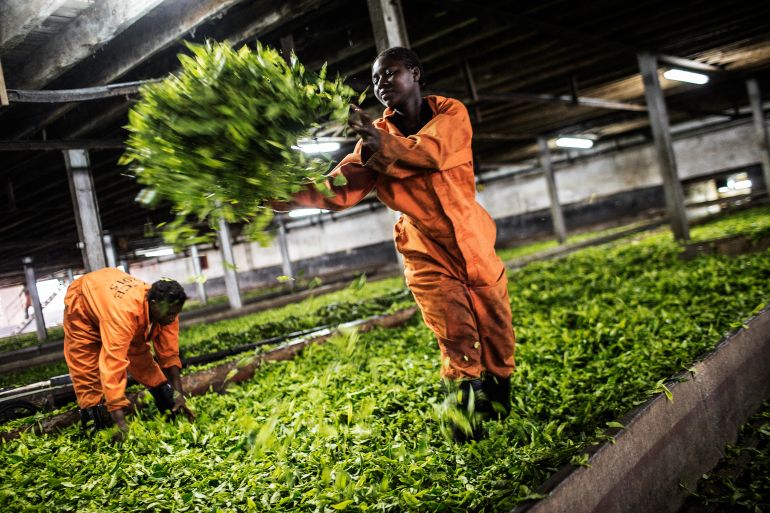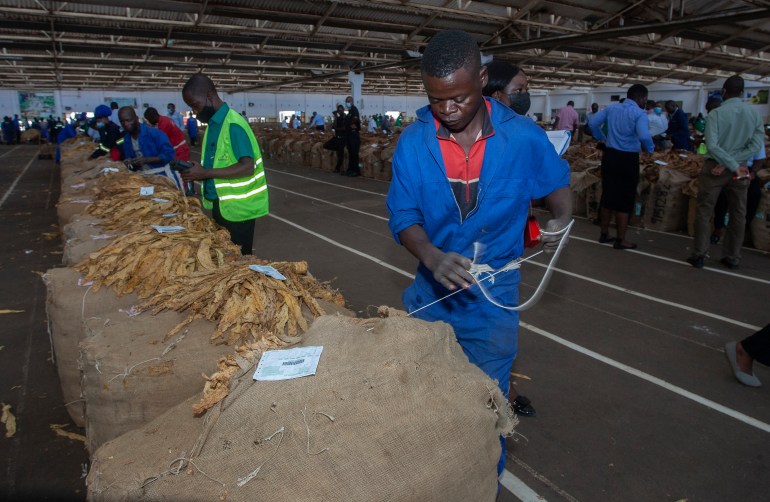Apprehension in Malawi as government sends workers to Israel amid Gaza war
Opposition leader Kondwani Nankhumwa questions the secrecy of the deal and describes it as ‘an evil transaction’.

Blantyre, Malawi – The departure of hundreds of Malawians to Israel to work as farm labourers has sparked a debate within the Southern African country, which is looking to raise much-needed foreign currency amid a cash crunch.
On November 25, the first tranche of 221 workers left for Israel. Subsequent flights are expected in the days to come, according to a statement from the Ministry of Labour, which did not mention numbers.
Keep reading
list of 4 itemsWhat role do US tech giants play in powering Israeli war crimes?
Jobless engineers, MBAs: The hidden army of Indian election ‘consultants’
ByteDance prefers TikTok shutdown in US over sale: Report
Details about the programme were first made public on November 23 by Kondwani Nankhumwa, leader of the main opposition Democratic Progressive Party as he spoke in parliament, questioning the secrecy of the deal and describing it as “an evil transaction”.
“[The] government has gone into such an agreement with Israeli companies when it is fully aware that there is war. No sane parent can send his or her child to work in a country that is at war,” Nankhumwa told journalists after.
The move comes after months of Malawi facing a forex shortage that has disrupted businesses and led to the scarcity of essential commodities like fuel. The country is also experiencing a cost-of-living crisis further exacerbated by the central bank devaluating the national currency, the kwacha, by 44 percent “to counter supply-demand imbalances”.
In November, President Lazarus Chakwera suspended foreign travel for government officials – the latest drastic measure to conserve funds in the country.
The recent move is, therefore another attempt by the government to create jobs for its youthful population – half of Malawi’s 19 million people are 18 or below – and generate foreign exchange. According to the authorities, only 9 percent of its 20 million people are formally employed.
In November, the IMF pumped in $174m into the country as an extended credit facility. That same month, the government of Israel gave out a $60m aid package to Malawi to prop up its economy.

A new chapter
That aid and the dispatch of workers mark a new chapter in diplomatic ties between Malawi and Israel, which date back to the 1960s. For decades, Israel sent doctors and agricultural experts to Malawi. Malawis have also gone to Israel to study agriculture, which remains a major source of revenue for the country.
During the Yom Kippur War of 1973, the Organisation of African Unity, the forerunner of the African Union, severed ties with Israel. Only four African countries remained steadfast. Malawi was one of them.
In 2021, a year after taking office, Chakwera hinted that Malawi would strengthen relations by opening an embassy in Jerusalem. It has not done so yet.
Government officials said the move to send workers to Israel is mutually beneficial for both countries, even if many details remain unclear.
The Israeli Ministry of Agriculture and Rural Development has said 30,000 to 40,000 workers have left the country’s farms since the October 7 attacks by Hamas on southern Israel. Half of them are Palestinians, whom Israel has barred from entering from the occupied West Bank. Consequently, it has been on the hunt for up to 5,000 workers from elsewhere, including from its loyal ally Malawi.
Authorities from the two countries have made assurances that the recruits will not be involved in warfare. But commentators are nevertheless questioning the timing and wondering if Malawi can repatriate its citizens if anything goes wrong as the war continues.
“Everybody, including Thailand, is pulling out their people from Israel,” Victor Chipofya, a political science lecturer at Blantyre International University, told Al Jazeera by telephone. “How come Malawi is the only country taking our people to Israel? Those are the questions that we’re supposed to be asking ourselves.”
Thai workers account for one of the largest migrant groups in Israel. As many as 30,000 of them were employed on farms in the country at the time of the Hamas attack. At least 32 Thais were taken captive on October 7, and many remain trapped within the Gaza Strip and Israel.
An unknown number of Malawians may also be trapped in Gaza.
After the war began, Chakwera called for a “cessation of violence by all parties” and the end to military action against known civilian targets in Gaza. He also called for the safety of 300 Malawians in Gaza who are believed to either be residents there or on pilgrimage in Israel. The Ministry of Foreign Affairs is yet to confirm if they have since returned home.
When asked about them and the workers who left Malawi last week, a ministry spokesperson directed Al Jazeera to the Labour Ministry, which did not respond.
The Centre for Social Accountability and Transparency, a nonprofit based in Lilongwe, has said it is engaging the National Assembly to address the concerns of Malawians that workers sent to Israel might be at risk of bodily harm or worse.
William Kambwandira, its executive director, described the arrangement as “unfortunate” and akin to modern-day slavery.
“Malawians are interested to know whether this is a government-to-government deal and what are the terms of reference for this deal, including what safety measures have been put in place to protect the young Malawians,” he told Al Jazeera.
The debate continues
Officials of the Malawian and Israeli governments have tried to assuage fears about Malawian citizens getting caught up in the war.
In a statement on November 24, Secretary for Labour Wezi Kayira said the export of working personnel will also involve other countries and not only Israel, but there was no mention of any other countries.
“The safety and security of the youth is paramount,” the statement read. “On the Israel labour export, the youth will work at certified and approved locations which are classified as fit and safe environments.”
The young people will work on farms only and “will not be involved in any other activity”, she said, adding that medical insurance and repatriation arrangements are in place for those involved.
“This program will benefit both individuals and the nation,” the statement added. “A portion of wages will cover living costs in Israel while the remainder will be remitted to personal accounts in Malawi to boost foreign exchange.”
In a recent interview, Michael Lotem, the Israeli ambassador to Kenya, Uganda and Malawi, dismissed the concerns, saying the young people are not going to the Gaza Strip but will work in Israel.
“We will take care of them as much as we are taking care of Israelis,” Totem was quoted as saying in the Malawian daily The Nation. “Of course, we are cautious that we do not have to allow people into certain areas that are targeted by Hamas, especially the borders.”
Reports of the Malawian contingent signing an agreement to indemnify Israel have also surfaced on social media. Al Jazeera could not independently verify this agreement.
“I understand that in this war, thousands of missiles have been and continue to be shot by Israel’s enemy at mostly civilian targets over Israel. I understand that many but not all the missiles are being shot down by anti-missiles systems but that some of the missiles hit their targets and that the hits as well as shrapnel can kill and injure persons [and] there is danger of terror attacks due to the war,” it reads.
In parliaments and across Malawi, the debate continues.
Chipofya has accused the president, a Christian, of having a “soft spot” for Israel like Malawi’s first president, Kamuzu Banda, who also belonged to the ruling Malawi Congress Party.
“I feel that the current administration through Chakwera might be making certain decisions based on religious convictions and not necessarily understanding the political implication that these things may have in the long run,” he said.